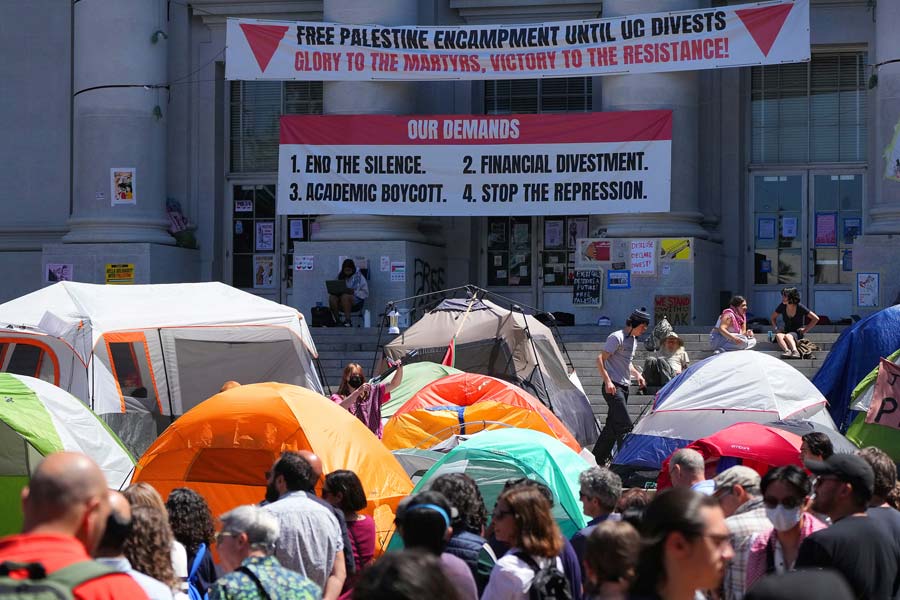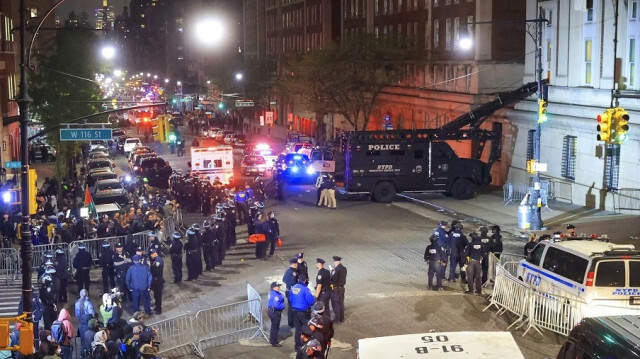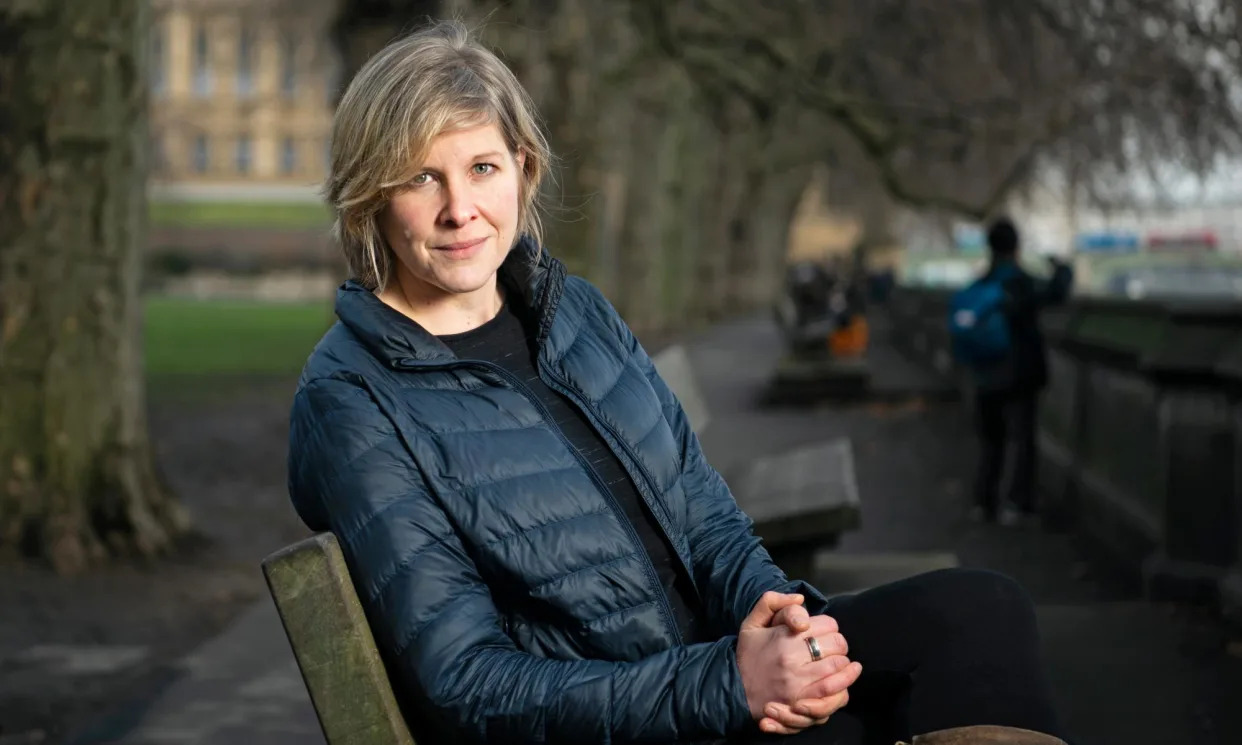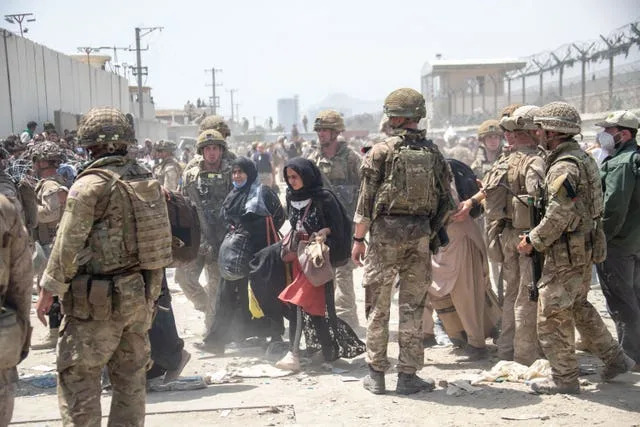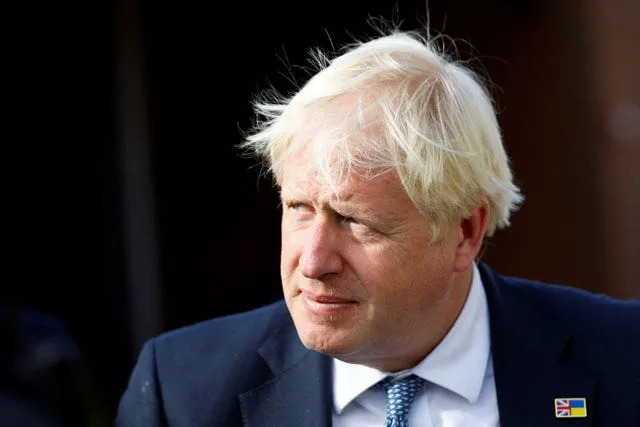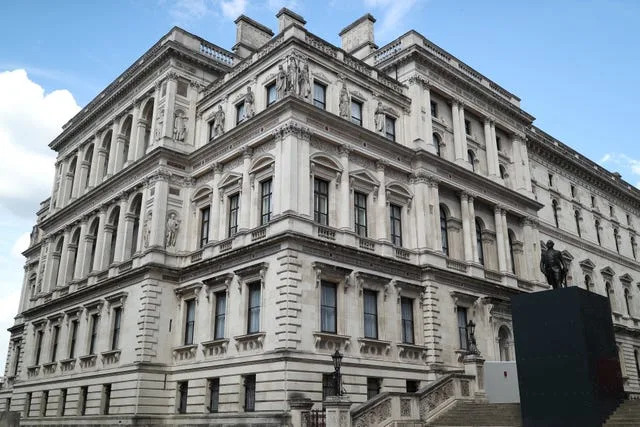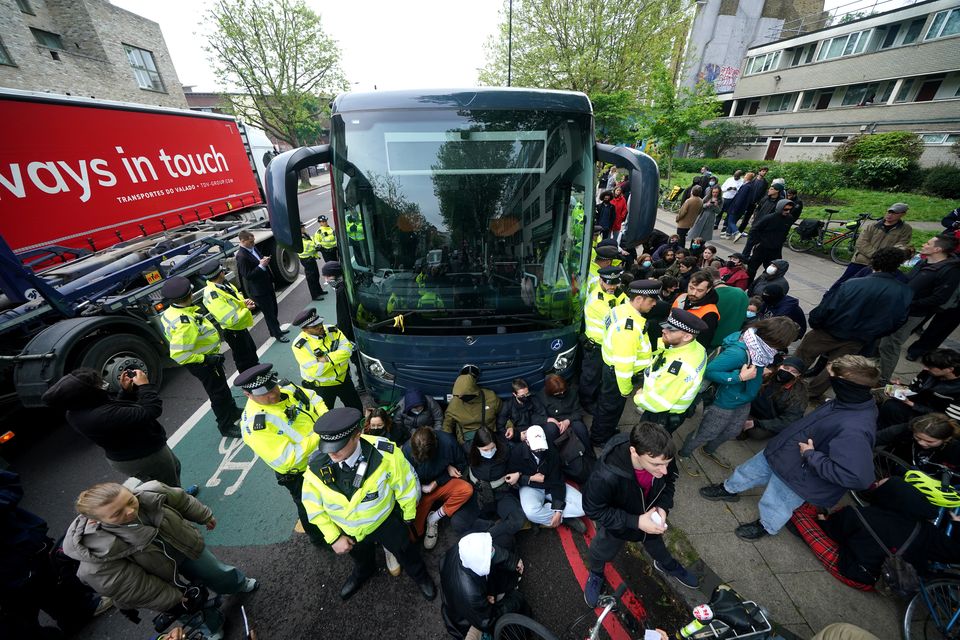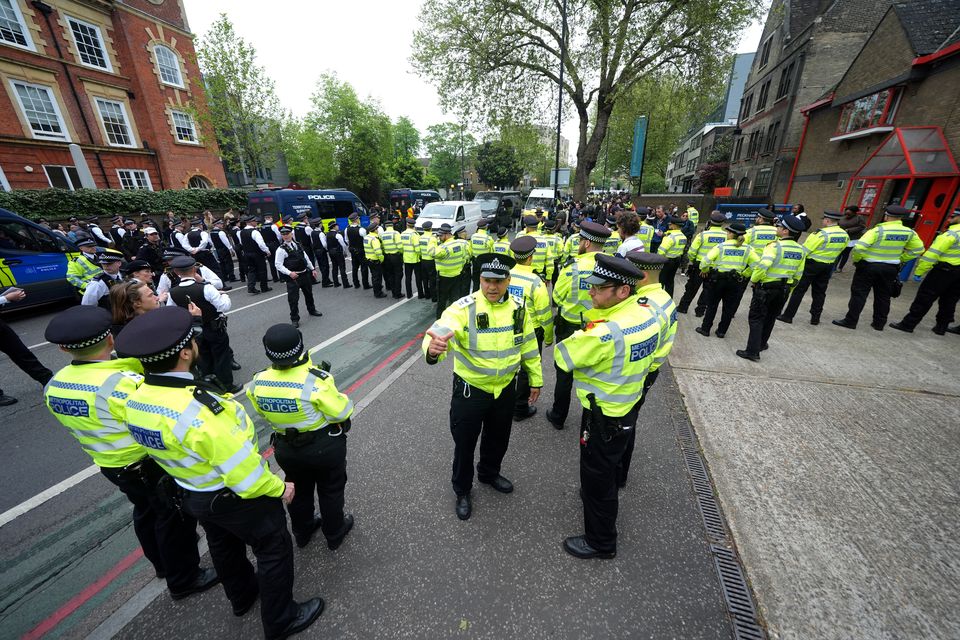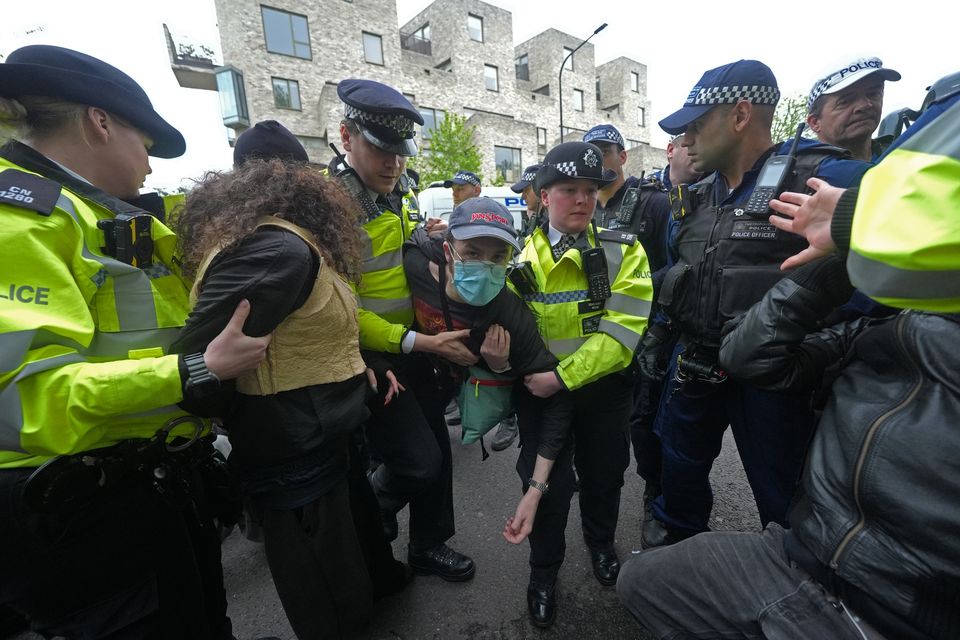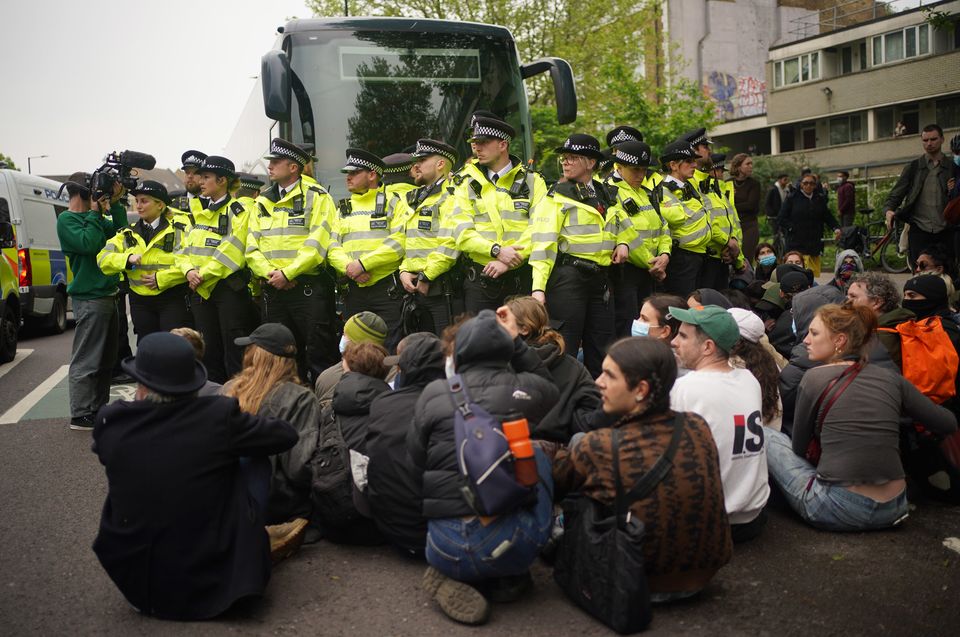In pictures: Palestine solidarity protests spread across the world
The "Student Spring" protests on US campuses, the biggest since the Vietnam demonstrations in the 1960s and 1970s, have inspired universities from Australia to Mexico to the United Kingdom to protest in solidarity with Palestine.

AFP
Members of the Australian Palestinian community shout slogans at the Palestinian Protest Campsite at University of Sydney in Sydney on May 3, 2024. / Photo: AFP
Thousands of students protesting Israel's war in Gaza rallied at some of the top universities worldwide demanding divest from companies with ties to Israel, in a movement inspired by the student protests in several US campuses.
Hundreds of people protesting Israel's war on Gaza set up an encampment last week outside the sandstone main hall at University of Sydney, one of Australia's largest tertiary institutions.
Similar camps have sprung up at universities in Melbourne, Canberra and other Australian cities.
Unlike in the US, where police have forcibly removed scores of defiant antiwar protesters at several colleges, demonstration sites in Australia have been peaceful with scant police presence.

AFP
Members of the Australian Palestinian community gather at the Palestinian Protest Campsite at University of Sydney in Sydney on May 3, 2024.
In Canada, students erected antiwar camps across some of the largest universities, including the University of Toronto, the University of British Columbia and the University of Ottawa, demanding they divest from groups with ties to Israel.

AFP
Pro-Palestinian demonstrators wave flags and hold up smartphones outside the fenced in area of an encampment on the University of Toronto campus on May 2, 2024, in Toronto, Canada.
In Mexico, dozens of pro-Palestinian students from the country's largest university camped out in solidarity as well.

AFP
Pro-Palestinian students and activists face police officers after protesters were evicted from the library on campus earlier in the day at Portland State University in Portland, Oregon on May 2, 2024.
Mounting flags and chanting "Long live free Palestine," the protesters set up tents in front of the National Autonomous University of Mexico's (UNAM) head office in Mexico City.
The students called on the Mexican government to break diplomatic and commercial ties with Israel.

AFP
Activists from the Interuniversity and Popular Assembly in Solidarity with the People of Palestine erect tents in front of the rectory building of the Autonomous University of Mexico (UNAM)
In Türkiye, a group at Bogazici University's South Square held a rally in support of Palestine, carrying balloons and signs in Turkish, English, and Arabic.
Students condemned Israel's attacks in Palestine despite international outcry, pledging solidarity with Palestinian people and denouncing the atrocities in Gaza with US support.
Students also called for an end to the humanitarian crisis and justice for the victims, urging intervention to stop the crimes against humanity committed by the Zionist regime.

AA
Students from Bogazici University Islamic Studies Club (BISAK) gather to organise a solidarity demonstration for Pro-Palestinian encampment in the US universities such as Columbia University, in Istanbul.
Students from the universities Warwick, York, Leeds, Newcastle, Bristol and Sheffield in the United Kingdom are set to hold action at the campuses against administration of universities and British government in solidarity with the Palestinians.
Students will finalise demands and publish them at the Bristol University while they hold protest/rally outside the senate of the University.

REUTERS
People gather during a protest in support of Palestinians, during the ongoing conflict between Israel and the Palestinian Islamist group Hamas, at Newcastle University, in Newcastle, Britain.
Earlier this week, hundreds of students gathered outside the University of Tehran to express support for students in the US protesting against the Israeli war on Gaza.
Shouting slogans against Israel and the US, protesters condemned police action against students at various US universities in recent days, including Columbia University.

OTHERS
Students at Amirkabir University of Technology in the Iranian capital of Tehran are seen in a pro-Palestine rally on April 28, 2024.
In France, protesters supporting Palestine gathered at Paris' Sorbonne University, chanting "Free Palestine" and setting up tents.

AFP
Students display a giant Palestinian flag as they take part in a rally in support of Palestinians at the Sorbonne University in Paris on April 29, 2024.
The Sorbonne protest was peaceful, with students calling for the university to condemn Israel.
Police secured the area, and several French politicians, including Mathilde Panot, encouraged support for the protest.
Paris' Sciences Po university was closed for the day on Friday after a debate between the institute's leadership and students on the war in Gaza failed to ease tensions, prompting protesters to occupy it overnight.
Pro-Palestinian students camp out at Mexico’s largest university
Dozens of pro-Palestinian students from Mexico’s largest university camped out Thursday in solidarity with similar protests that have swept colleges in the United States.
Mounting flags and chanting “Long live free Palestine,” the protesters set up tents in front of the National Autonomous University of Mexico’s (UNAM) head office in Mexico City.
The students called on the Mexican government to break diplomatic and commercial ties with Israel.
“We are here to support Palestine, the people who are in Palestine, and the student camps in the United States,” said Valentino Pino, a 19-year-old philosophy student.
Jimena Rosas, 21, said she hoped the protest would have a domino effect and spread to other universities in the country.
“Once people see that UNAM is beginning to mobilize, other universities should start as well,” she said.
Dozens of universities in the United States have seen pro-Palestinian demonstrations in recent weeks, leading to clashes with police and counter-protests.
The Gaza war started when Hamas militants staged an unprecedented attack on Israel on October 7 that left around 1,170 people dead, mostly civilians, according to an AFP tally of Israeli official figures.
Israel’s retaliatory offensive has killed more than 34,500 people in Gaza, mostly women and children, according to the Hamas-run territory’s health ministry.
Pro-Palestinian protesters set up encampments at universities in Australia
University of Sydney vice chancellor Mark Scott said there was space for both groups of protesters.
Protesting students occupy an area of the quadrangle at the University of Sydney (Rick Rycroft/AP) (Rick Rycroft/AP)
By Associated Press Reporter
Pro-Palestinian protesters are camping on university campuses across Australia, with some scuffling with pro-Israel protesters in Sydney – mirroring similar events in the United States.
Students have set up encampments at universities in major Australian cities over the last two weeks to protest over Israel’s offensive in Gaza.
The students are demanding that universities sever all academic ties with Israel and cut off research partnerships with arms manufacturers

No arrests were made, as the violence seen on some American campuses has not occurred in Australia.

Hundreds of pro-Palestinian protesters on Friday met a counter-protest supporting Israel at the University of Sydney, Australia’s oldest univrsity.
The Australian Broadcasting Corporation reported a scuffle between the groups.
Supporters of both sides later backed down because of a heavy security presence.
University of Sydney vice chancellor Mark Scott said there was space for both groups of protesters.
“They may strongly disagree with the matters that have been discussed. … We can host that conversation and we should be able to do that in a non-threatening way,” he told ABC.
Mr Scott said not all of the protesters were students, and that some might not be committed to peaceful and productive engagement.
“We are working with security and police,” he said.
ByHT News Desk
May 03, 2024
Over the past two weeks, students across major Australian cities have established protest encampments on university campuses.
Australian university campuses witnessed pro-Palestinian protests on Friday. In Sydney, tensions escalated as scuffles broke out between the pro-Palestinian protesters and pro-Israel counter-protesters. These demonstrations mirrored similar protests unfolding on campuses across the United States.

Over the past two weeks, students across major Australian cities have established protest encampments on university campuses. Their demonstrations are in response to Israel's recent military offensive in Gaza. The student protesters are calling for their universities to cut all academic ties with Israel and terminate research collaborations with arms manufacturers. This move aims to exert pressure on Israel through academic and research channels in light of the ongoing conflict in Gaza.
Similar protest camps have been set up in Melbourne, Canberra and other Australian cities.
Due to heavy security presence, the protestors from both sides backed down in Sydney.
Addressing the situation, University of Sydney Vice Chancellor Mark Scott affirmed that there was space for both groups to express their views peacefully on the university grounds.
“They may strongly disagree with the matters that have been discussed. ... We can host that conversation and we should be able to do that in a non-threatening way,” he said to ABC.
Read Here: Parveen Shaikh, Mumbai school head ousted for pro-Palestine stance, gets parents' support
Scott added that not all the protestors were university students and expressed concerns that some of the individuals involved might not be genuinely committed to peaceful and productive engagement on the issue.
“We are working with security and police,” he said.
Despite being a longstanding ally of Israel, Australia has grown increasingly critical of Israel's conduct in the conflict, especially after an Australian aid worker was killed in an Israeli attack last month.
At the demonstrations, protesters voiced their dissatisfaction with the Australian government's efforts, claiming it has not done enough to push for peace in the region. They led chants against Prime Minister Anthony Albanese and his administration, expressing their discontent with the government's response to the ongoing crisis, Reuters reported.
Sciences Po uni closes main Paris site over Gaza protest
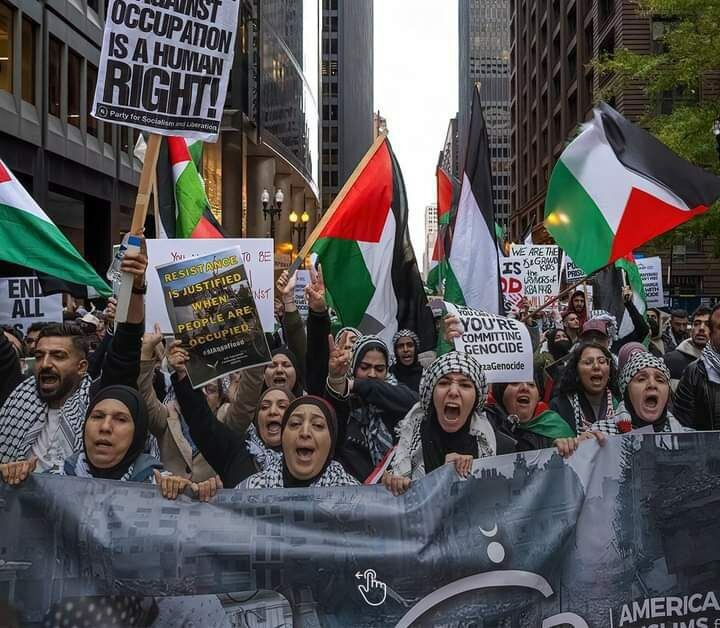
TEHRAN, May 03 (MNA) – France's prestigious Sciences Po University said it would close its main Paris site on Friday due to a fresh occupation of buildings by dozens of protesting pro-Palestinian students.
In a message sent to staff on Thursday evening, its management said the buildings in central Paris "will remain closed tomorrow, Friday, May 3. We ask you to continue to work from home".
According to Agence France-Presse, a committee of pro-Palestinian students earlier Thursday announced a "peaceful sit-in" at Sciences Po and said six students were starting a hunger strike "in solidarity with Palestinian victims" in war-torn Gaza.
Echoing tense demonstrations rocking many top US universities, students at Sciences Po have staged a series of protests, with some furious over the Gaza war and ensuing humanitarian crisis in the besieged Palestinian territory of Gaza.
The Paris regional authority's right-wing head Valerie Pecresse temporarily suspended funding to Sciences Po earlier this week over the protests, condemning what she claimed "a minority of radicalised people calling for anti-Semitic hatred".
Israel waged a genocidal war on the besieged Gaza on October 7 after the Palestinian Hamas Resistance group carried out a historic operation against the occupying entity in retaliation for the regime’s intensified atrocities against the Palestinian people.
At least 34,596 Palestinians have been killed and 77,816 wounded in Israeli attacks on Gaza since October 7.
A member of the student committee who identified himself only as Hicham said the hunger strikes would continue until the university's board voted on holding an investigation into its partnerships with Israeli universities.
SD/PR
